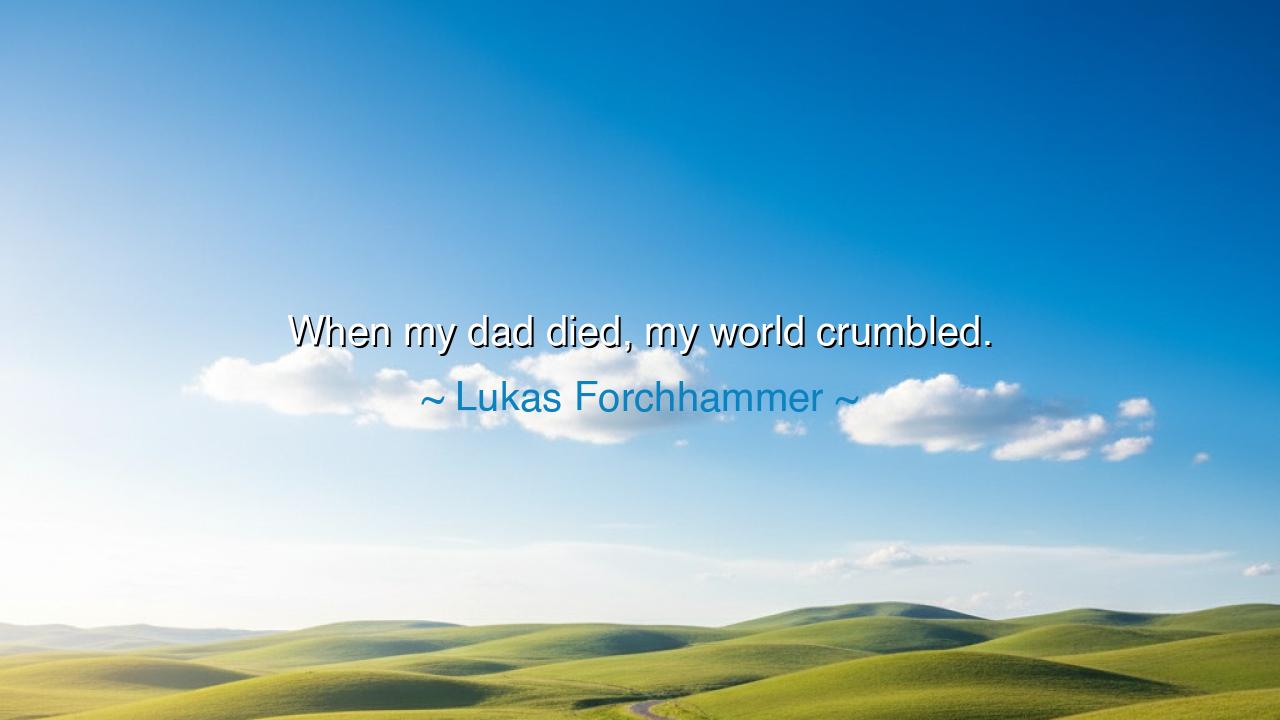
When my dad died, my world crumbled.






The words of Lukas Forchhammer — “When my dad died, my world crumbled” — carry the weight of a truth as old as time: that the loss of a father is not merely the loss of a man, but the falling of a pillar that once held the heavens of the soul. In these few words lies a grief both personal and universal — the moment when the foundation of certainty gives way, and the child within us is left standing amid the ruins of memory, reaching for a voice that will never answer again.
Forchhammer, the Danish singer and songwriter of the band Lukas Graham, spoke these words not as an artist but as a son — a son mourning the man who shaped his world. His father, a man of warmth and wisdom, was the moral compass and quiet architect of his son’s being. When he passed away, Lukas was left to face life not only without a father’s presence but without the grounding force that had given meaning to everything before. His quote reflects that moment of spiritual collapse — that “crumbling” which comes when love, habit, and guidance are all torn from one’s grasp at once. It is not the collapse of the body, but of the world within.
The ancients knew this sorrow well. In every culture, the father has been seen as both protector and builder — the one who carries the torch of lineage, who passes down the wisdom of how to live and endure. When that torch goes out, the world darkens, even for the strongest of hearts. Consider the story of Alexander the Great, who, upon the death of his father Philip of Macedon, was thrust suddenly into the vast responsibilities of kingship. Though outwardly triumphant, he confessed to his closest companions that he felt an emptiness nothing could fill. For all his conquests, his heart was haunted by the loss of the man whose shadow had once been his strength.
The crumbling world Forchhammer speaks of is thus not a metaphor for weakness, but a recognition of the sacred structure that the father represents. To lose him is to see the temple of one’s childhood collapse — every stone carved by memory, every pillar inscribed with laughter and lessons. The sound of that collapse echoes through the years. And yet, as in all collapses, something new may emerge from the dust. Grief, though it destroys, also reshapes; it burns away illusions and reveals what remains indestructible.
In his music, Lukas transformed that pain into art — proof that the heart can build again, though never in the same shape. From grief came songs like “7 Years,” in which he reflects on youth, time, and the legacy of his father’s words. This transformation mirrors an eternal truth: that the work of mourning is also the work of creation. When the old world falls, a new one must be built — not to replace what was lost, but to honor it. The son becomes the builder, carrying within him the lessons of the father, now transmuted into his own life’s craft.
In this way, grief becomes a teacher. It teaches humility — the recognition that love and time are finite. It teaches gratitude — the awareness that what we once took for granted was a gift beyond measure. And it teaches strength — not the strength of denial, but of acceptance. To live on after loss is to carry two worlds: the world that was, and the world that must be rebuilt. Those who endure such sorrow become the inheritors of wisdom, for they have walked through the valley where life and death embrace, and returned with eyes that see more deeply.
Let this be the lesson for all who listen: treasure those who stand as your pillars while they yet live. Speak to them, learn from them, forgive them, and let them know you love them — for every word unsaid becomes a stone in the heart once they are gone. And when loss does come, do not despair as though the world has ended; instead, take up the fragments and build anew, for within your own hands lies the power to give their memory shape.
Thus, when Lukas Forchhammer says, “My world crumbled,” he is not describing defeat, but transformation — the moment when the child’s world ended, and the man’s world began. For from every ruin, if one listens closely, the voice of the departed still whispers: “Build again — and live.”






AAdministratorAdministrator
Welcome, honored guests. Please leave a comment, we will respond soon